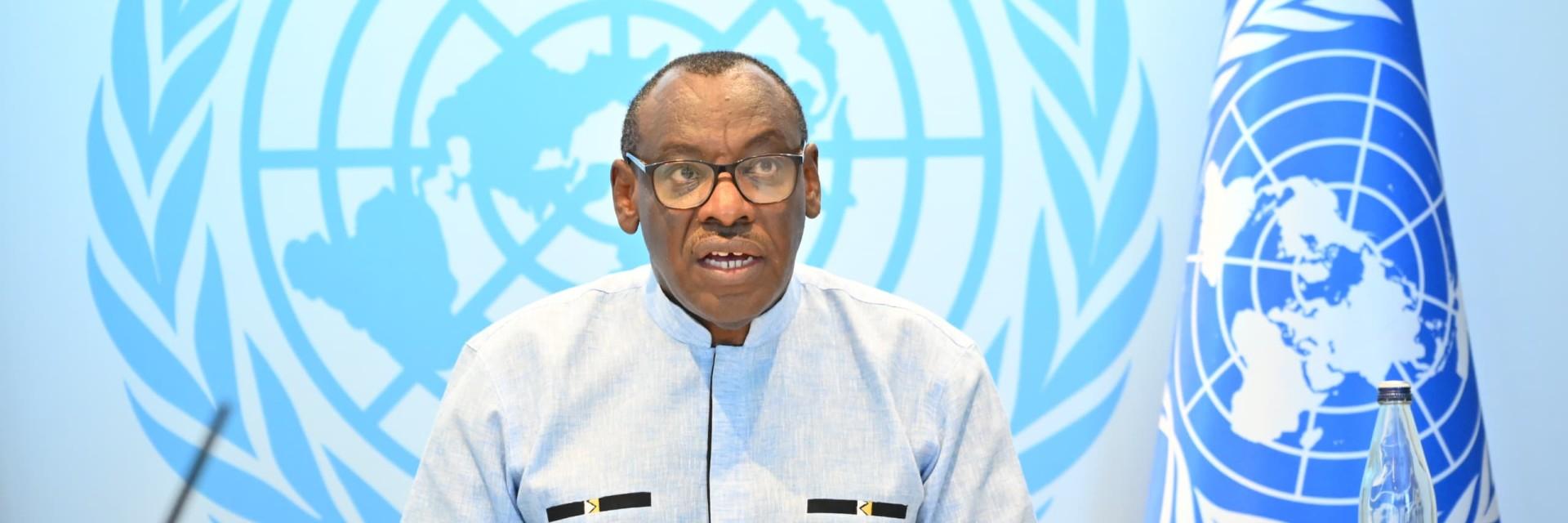RETREAT OF THE UN DEPUTY SECRETARY-GENERAL WITH RESIDENT COORDINATORS IN AFRICA
Opening Session:
Countdown To 2030: State of the World and Delivering the SDGs
Keynote Remarks
(Virtual)
By
Mr. Claver Gatete
United Nations Under-Secretary-General and
Executive Secretary of ECA
Luanda, Angola
17 May 2025
Excellencies,
Deputy Secretary-General of the United Nations,
Resident Coordinators,
UN Colleagues and Partners,
Ladies and Gentlemen:
It is an honour to join you virtually for this timely and critical Retreat that brings together our leadership across Africa at a defining moment in our shared journey towards achieving the Sustainable Development Goals.
With just five years remaining to 2030, the path before us has narrowed significantly.
Africa today finds itself navigating a complex web of polycrises from climate shocks and mounting debt distress to geopolitical instability and the disruptive consequences of global financial fragmentation.
These challenges are compounded by a decline in official development assistance and the erosion of long-standing multilateral frameworks, which together are creating a growing development vacuum affecting the continent.
The consequences are stark.
Africa’s public debt surged to US$1.86 trillion in 2024, with the average debt-to-GDP ratio rising from 44.4% in 2015 to 66.7% today.
As a result, resources are being diverted from other critical development priorities.
Consequently, today, of the 169 measurable targets, only 4 are currently on track.
70 are advancing too slowly, while 29 are regressing.
The fact that over 600 million Africans remain without electricity and 476 million live in poverty, including 149 million newly pushed into deprivation by climate and economic disruptions, is a challenge that demands urgent corrective action.
Moreover, the financing gap to achieve the SDGs in Africa has increased by up to US$1.3 trillion annually.
And while Africa’s GDP is set to increase to 3.8% in 2025 and 4.1% in 2026, this remains below the 7% growth needed to achieve SDG 8 and combat poverty, though it does exceed the OECD’s global GDP estimate of 3.1%.
However, it is not all gloomy for Africa.
The recently adopted Pact for the Future, endorsed at the Summit of the Future, offers a renewed and forward-looking global agenda anchored in solidarity, sustainability and digital transformation.
Crucially, Africa is not starting from zero.
The continent continues to build on foundational frameworks such as the AU’s Agenda 2063 and is leveraging transformative platforms like the African Continental Free Trade Area to recalibrate its development trajectory.
In this context, allow me to share five critical priorities that must guide our collective efforts to accelerate the SDGs in Africa.
First, we must urgently reform the global financial architecture, a foundational imperative to correct structural asymmetries that continue to marginalize African economies.
The current system limits access to affordable, long-term financing, thereby exacerbating vulnerability and stifling development.
And the ECA, as part of the UN High-Level Working Group on the Global Financial Architecture, is at the forefront of advocating for a more inclusive, equitable and representative global system.
In tandem, we are working with Member States to strengthen fiscal governance and enhance sovereign credit ratings to create pathways to greater financial resilience.
Second, Africa must unlock its potential through robust domestic resource mobilization.
Sustainable development requires sustainable financing from within.
Yet Africa’s capacity in this area remains significantly underutilized.
Expanding the tax base, curbing illicit financial flows and digitizing revenue systems must become strategic priorities.
Equally, channeling sovereign wealth and pension funds into national development priorities can be transformative.
And by leveraging the AfCFTA to deepen regional value chains and promote trade-led industrialization, African economies can dramatically expand their fiscal space.
The ECA is committed to working hand-in-hand with Resident Coordinators and national institutions to design and implement country-specific DRM strategies anchored in macroeconomic stability and inclusive growth.
Third, we must confront the intersection of debt, development and climate vulnerability through integrated solutions.
These challenges are mutually reinforcing and must be addressed as such.
Reforming climate finance is especially urgent as adaptation and resilience financing remains fragmented, unpredictable and insufficient.
Furthermore, the establishment of an African Credit Rating Agency will enhance the capacity of member countries, helping to lower borrowing costs, increase transparency and challenge unfair assessments by dominant global rating agencies.
At the same time, ECA is supporting countries to develop green transition strategies, including investing in renewable energy, climate-smart agriculture and nature-based solutions, so that climate action becomes a development accelerator.
Fourth, we must close the critical data gap that undermines our ability to plan, implement and track progress.
Today, data gaps on SDG indicators are a principal reason many African countries are off-track.
The ECA is therefore working to modernize statistical systems, enable interoperability across government institutions, and digitize civil registration and vital statistics.
Fifth, Africa must speak with one voice on the global stage.
The upcoming Fourth International Conference on Financing for Development, the Second World Summit for Social Development, COP 30 and the 2025 High-Level Political Forum provide critical opportunities to elevate Africa’s collective priorities.
These must not become missed opportunities.
With coherent, data-driven and action-oriented positions, Africa can shape the global development agenda.
The ECA, in close coordination with the African Union and the wider UN system, stands ready to support this endeavour.
Distinguished Colleagues,
Resident Coordinators have a central role to play.
You are uniquely positioned to engender integration at the country level, ensure policy coherence, mobilize political will and catalyze coordinated action in pursuit of the 2030 Agenda.
Together, we can work to help recalibrate Africa’s path toward attaining the 2030 Agenda.
Thank you.

